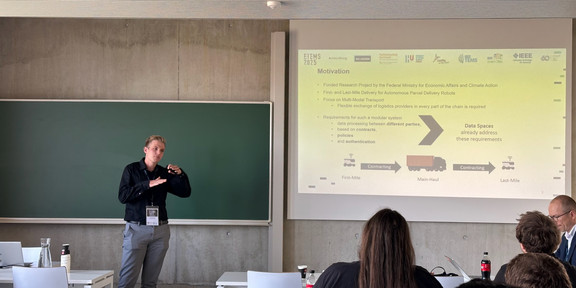IEEE E-TEMS 2025: Best Paper Award received

The 2025 IEEE European Technology & Engineering Management Summit (E-TEMS) recognized a standout research contribution with its Best Paper Award: Federated Data Spaces as an Enabler for Smart City Services – A Logistics Use-Case Example.
This paper addresses a central challenge in modern smart cities: the need to link heterogeneous data pools while respecting the stringent privacy protections mandated by the EU's General Data Protection Regulation (GDPR). While innovative technologies have made data collection easier, combining datasets across different domains remains difficult due to privacy, interoperability, and data sovereignty concerns.
To bridge this gap, the paper proposes FedDSGcon, a practical and easy-to-use demonstrator that integrates two key technologies:
-
Gaia-X, which ensures compliance, trust, and data sovereignty among participants
-
Eclipse Data Space Connector (EDC), which facilitates secure, controlled, and interoperable data exchange
By merging these two frameworks, we offer a novel approach that leverages the strengths of both systems. A logistics use-case illustrates how this integration can enable advanced, GDPR-compliant smart city services, such as optimized urban deliveries or multimodal transportation planning. The paper also includes a practical instruction set for setting up FedDSGcon, making the research actionable for cities, developers, and policymakers.
This recognition highlights the importance of Federated Data Spaces in creating smart city ecosystems that are not only innovative but also secure and citizen-centric.
Stay informed as this approach paves the way for more responsible and effective data-sharing strategies in urban environments.
Paper Abstract
Innovative technologies enable the collection of Smart City data resulting in a lot of heterogeneous data pools. Linking these leads to the development of more complex services, which enables added value services for citizens. Since the General Data Protection Regulation (GDPR) guarantees extensive data rights for EU citizens, the linking of the above mentioned data pools becomes quite complicated. In order to accomplish this, a variety of different implementations for Federated Data Spaces are currently being developed. Gaia-X is one of the most relevant Data Space architectures and the Eclipse Data Space (EDC) implementation is another. However, they focus on different aspects. Gaia-X solves the problems of data sovereignty and compliant participants and the EDC allows the control of data transfer and interoperable data exchange.

